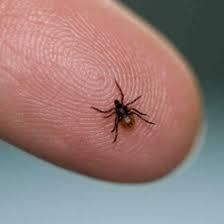TICKS IN NEW JERSEY
 |
In New Jersey we have four hard bodied ticks. For proper ID they should be seen under a microscope. |
October is an active time for adult
ticks and it is important that we stay diligent with their detection. Even an
Indian Summer can cause these tiny creatures to become active when we often let
our guard down.
In New Jersey we have four hard body
ticks; The American Dog tick, the Brown Dog tick, the Lone Star tick and Deer
ticks. It is the Deer tick, also known as the 'Black legged tick' that causes
humans in our area the most concern due to the transmission of 'LYME DISEASE'.
 |
Knowing which tick you have will help your doctor decide on a course of treatment. Call you local Cooperative Extension Service for information. |
Throughout the country ticks transmit different diseases including 'Rocky Mountain Spotted Fever', so always be aware of the ticks in your area and the problems they can cause.
 |
If you find a tick outside of NJ the same suggestion applies. Have your tick identified and inform your doctor. |
Early tick detection is the surest way to avoid problems. This simply means taking a visual exam of yourself and your children every day. Deer ticks need 24-36 hours to transmit the Lyme Disease bacteria. An adult Deer tick is about the size of a sesame seed. Now with more and more deer roaming though our area we need to increase our guard.
 |
When in tick habitat wear long pants and tuck them in your socks |
Since ticks cannot fly or jump they have developed an ingenious way to get
on their host. Tick crawl up a blade of grass and wait for a host animal or human
to brush by and give them a ride. This is know as 'questing'. The best place for this to happen is in parks where the field meets the
tree lines. Avoid this area whenever possible, especially while wearing short
pants.
If you do find a tick correct removal
is very important. Remove the tick carefully with tweezers and put it into a
container with a moist cotton ball (an old prescription bottle works best). A
good tick specimen is essential if your doctor decides to have it tested. Do not put
rubbing alcohol on the tick as it will kill the bacteria and that tick will no
longer be viable for testing.
Your local Cooperative Extensive service will either identify your tick or tell where to take it. Here in New Jersey call your local county 'Rutgers Cooperative Extension Garden Helpline'
Rutgers suggest you
always call your doctor when you are bitten by any tick. They will know the best
course of action to be taken.
Keep Safe, James
Keep Safe, James
.


No comments:
Post a Comment